
 Ushtria Ēlirimtare E Kosoves (UĒK)
Ushtria Ēlirimtare E Kosoves (UĒK)
Kosova Liberation Army (KLA) |
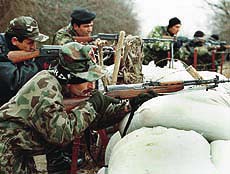 The KLA: braced
to defend
The KLA: braced
to defend and control This article appears in the April 1999 edition of Jane's Intelligence Review Over the last year, the Kosova Liberation Army (KLA) has transformed itself from a band of guerrillas to a structured force capable of running political and internal affairs. Zoran Kusovac reports how they did it. 
|

Kosovo preparing for war BBC News, January 13, 1999 BBC Nine o'clock news Correspondent Ben Brown reports from a secret KLA training camp on the delicate ceasefire 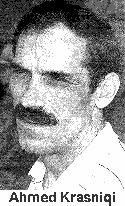 Kosovar separatist leader
Kosovar separatist leaderassassinated in Albania TIRANA, Albania (CNN) -- The United Nations moved closer Tuesday to laying the groundwork for military intervention in Kosovo, while Ahmet Krasniqi, a top member of the self-styled Kosovo government in exile was assassinated in Albania. Ahmet Krasniqi, said to be the defense minister of Kosovo's ethnic Albanian government, was shot to death in Albania's capital late Monday. "Mr. Krasniqi was killed by unidentified gunmen while entering his home in Tirana," said Artan Bizhga, a spokesman for the Albanian Interior Ministry. (Sep. 22, 1998) Yugoslav secret services accused of being behind Mr Krasniqi's death (The Irish Times, AFP) -- Mr Ahmet Krasniqi (50), Kosovo's so-called defence minister who was killed by unknown gunmen near his home in the Albanian capital on Monday, was buried in Tirana yesterday with full Albanian military honours. Albanian national guardsman fired a round of honour as Mr Krasniqi's coffin was lowered into the grave, while a military band played the funeral march as several hundred people looked on. In a funeral address, a Kosovo Albanian leader, Mr Ibrahim Shala, vowed ethnic Albanians would continue their fight for independence from Serbia until victory. Albanian and Serb sources in the Kosovo capital, Pristina, said Mr Shala was in charge of placing KLA fighters under the command of the Kosovo armed forces, a small grouping that Kosovo's ethnic Albanian political leader, Dr Ibrahim Rugova, is trying to set up as an army. "Ahmet Krasniqi was a brilliant figure who put in place the basis for the Kosovo armed forces," Mr Shala said. He accused Yugoslav secret services of being behind Mr Krasniqi's death. (Sep. 29, 1998) Second Kosovo Albanian leader shot in days (BBC News) -- A close aide to Ibrahim Rugova, the main ethnic Albanian leader in Kosovo, has been shot and seriously wounded. The aide, Sabri Hamiti was attacked in front of his house in a Pristina suburb, sources close to Rugova said. Two bullets hit just above his heart and one broke his arm. Hamiti was taken to a Pristina hospital. It's not known who carried out the attack. On Monday, another supporter of Mr Rugova, the defence spokesman of the Kosovo government-in-exile, Ahmet Krasniqi was shot and killed in the Albanian capital Tirana. His colleagues accused the Yugoslav secret services of the murder; observers say Mr Rugova's supporters may be under attack from Kosovo's main armed group, the KLA, because they are trying to set up a rival paramilitary force. (Sep. 25, 1998) Ethnic Albanians propose Kosovo peace plan (Sep. 20, 1998) |
|
Kosova Liberation Army [KLA]  Ushtria Clirimtare E Kosoves [UCK] During the war in former Yugoslavia, over 5,000 ethnic Albanians fought together with Croat and Muslim military formations. When the policy of non-violent resistance failed to make any progress, some ethnic Albanians turned to violence. Rugova's position began to be undermined when the Kosovo Question was left off the agenda at the Dayton Peace talks in November 1995. Younger Kosovars increasingly began to ask why they should hold fast to nonviolence when the Bosnian Serbs were rewarded for their violence and brutality with their own quasi-state within Bosnia. The Kosova Liberation Army -- KLA in English acronym or UCK in the Albanian acronym -- first appeared in Macedonia in 1992. In 1995 the beginnings of armed resistance to the Serbs appeared, when the KLA carried out isolated attacks on Serbian police. The KLA appeared for the first time in public in June 1996, assuming reponsibility for a series of acts of sabotage committed against the police stations and policemen in Kosovo and Metohija. After these bombings, Serb authorities named it a terrorist organization. Since 1997 the Kosova Liberation Army has conducted attacks on Serbian police and other officials. They did not attack Yugoslave Army military facilities, rather, their emphasis was ambushes of police patrols and attacks on Albanians who collaborated with Serbian authorities. 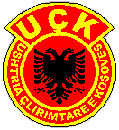
The Kosova Liberation Army is not a unified military organization subordinated to a political party or civil authority, but rather functions as a guerilla movement consisting of lightly armed fighters. However, its members carry visible insignia and execute the assignments of their command in a disciplined way. The KLA's strength has swelled from about 500 active members at the beginning of 1998 to a force of at least a few thousand men [though some estimates suggest that there are as many as 12,000 to 20,000 armed guerrillas]. The KLA is organized in small compartmentalized cells rather than a single large rebel movement. The KLA's strength is apparently divided between a maneuverable strike nucleus of a few hundred trained commandos, and the much larger number of locally organized members active throughout the region. The KLA typically performs actions in smaller groups, at times as few as three to five men. Many members of KLA units are professionally trained, and include former Yugoslav army soldiers. The group functions very professionally underground, due in part to fact that some of its leaders are former members of UDBA [Internal State Security Service], the army and the police. (full text) Kosova Liberation Peace Movement the Albanian Question Terrorism in Kosovo and Metohija and Albania Yugoslav "White Book" Yugoslav Federal Ministry of Foreign Affairs, FR Yugoslavia, Belgrade, Sep. 1998 Some aspects of contemporary terrorism by Milan Milosevic, Ljubomir Stajic, Police Academy Col. Milan V. Petkovic, Army of Yugoslavia, "Meaning" Jun 1998. |
|
U.S. envoy says Kosovo crisis nears 'general war'
Legitimate role for KLA in Kosovo peace (June 27, 1998) |
Milosevic has declared war to Albanians, Demaci
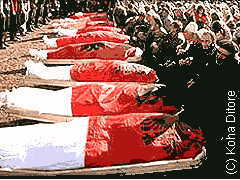 SRBICA, Yugoslavia - The official death toll from last week's violence is 46 ethnic Albanians
and six Serb police. The Albanians say at least 77 of their kin died in two police sweeps through
a region west of Pristina last week. Twenty-five were buried last week at a funeral attended by 30,000 mourners.
SRBICA, Yugoslavia - The official death toll from last week's violence is 46 ethnic Albanians
and six Serb police. The Albanians say at least 77 of their kin died in two police sweeps through
a region west of Pristina last week. Twenty-five were buried last week at a funeral attended by 30,000 mourners.
A list published in the local Koha Ditore newspaper identified 29 of those killed, among them 22 members of Adem Jashari's family. Serbs say Jashari was the leader of a militant group known as the Kosova Liberation Army. 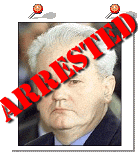 "While Mr. Milosevic is talking about political solutions, he's killing women and children," said Veton Surroi, an ethnic Albanian community leader.
"While Mr. Milosevic is talking about political solutions, he's killing women and children," said Veton Surroi, an ethnic Albanian community leader.
Adem Demaci -- a more militant leader known as Kosovo's Nelson Mandela for the decades he has spent in Serbian jails -- said the measures were too weak to bring "a spectacular step forward" from Milosevic. "Milosevic has declared war to Albanians," Demaci said. "Milosevic started the war. Milosevic started killing women and children. Albanian resistance will not cease." Serbs have brushed aside foreign criticism of excessive violence, saying they were cracking down on the Kosova Liberation Army, which claimed to have killed 50 people in the past 19 months. By DUSAN STOJANOVIC, Associated Press Writer (March 10, 1998) Copyright ©1998 Nando.net Copyright ©1998 The Associated Press Photo Copyright © Hoha Ditore |
|
Contact Group "wholly condemns terrorist actions by the Kosova Liberation Army or any other group or individual" 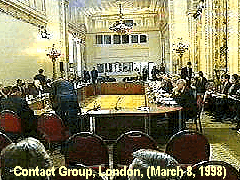 "(3.) Our condemnation of the actions of the Serbian police should not in
any way be mistaken for an endorsement of terrorism. Our position on this is
clear. We wholly condemn terrorist actions by the Kosova Liberation Army or
any other group or individual. Those in the Kosovar Albanian community who
speak for the different political constituencies should make it clear that they,
too, abhor terrorism. We insist likewise that those outside the FRY who are
supplying finance, arms or training for terrorist activity in Kosovo should
immediately cease doing so. "
"(3.) Our condemnation of the actions of the Serbian police should not in
any way be mistaken for an endorsement of terrorism. Our position on this is
clear. We wholly condemn terrorist actions by the Kosova Liberation Army or
any other group or individual. Those in the Kosovar Albanian community who
speak for the different political constituencies should make it clear that they,
too, abhor terrorism. We insist likewise that those outside the FRY who are
supplying finance, arms or training for terrorist activity in Kosovo should
immediately cease doing so. "
A statement on Kosovo issued on Monday , March 9, 1998 by foreign ministers from the United States, Russia, Britain, France, Germany and Italy. (Full text) |
|
US green light to crack down on the KLA PREKAZ, Serbia - Kosova Liberation Army (KLA) leader Adem Jasari who was among members of the family killed during fierce fighting on Thursday and Friday, police said. State television showed film on Friday of the Jasari compound littered with bodies. The walls of its houses and barns bore clear evidence of artillery shelling. Vecernje Novosti' military correspondent Miroslav Lazanski alleged that gun-running to the KLA was still continuing through neighboring Albania and that Albanians volunteers from Germany were trying to reach Kosovo via Macedonia. Lazanski wrote that police were now concentrating on suspected KLA villages around Djakovica, in western Kosovo, which is only 10 km (6 miles) from the Albanian border. The attacks this week on the alleged KLA bastions of Prekaz and Lausha in the mountains of central Kosovo were the heaviest unleashed against Albanian separatists since the southern Serbian province lost its autonomy in 1989. The KLA emerged as a military threat in response to growing impatience with the lack of progress made by political leaders demanding independence for Kosovo where 90 per cent of the 1.8 million population is Albanian. U.S. Secretary of State Madeleine Albright said in Rome on Saturday that Washington would not tolerate violence in Kosovo but she did not repeat earlier U.S. warnings of military intervention, saying only that ``nothing was ruled out.'' Belgrade authorities openly derided the threats as empty after U.S. Balkan envoy Robert Gelbard condemned the use of ``terrorism'' in Kosovo which Milosevic interpreted as a green light to crack down on the KLA. Police said KLA leader Adem Jasari, his brother and another senior guerrilla named Bajram Lustaku were killed during the fighting. Thirty KLA men were reported to have surrendered under guarantees of their personal safety, police said. Jasari was described as a KLA leader trained across the border in Albania and sentenced to 20 years in absentia for ``terrorist attacks'' in Kosovo in which police and civilians were wounded.
U.S. special Balkans envoy Robert Gelbard: Without question a terrorist group  LONDON (March 9, 1998) - Last month, U.S. special Balkans envoy Robert Gelbard visited Belgrade, praised Milosevic for his new cooperation in Bosnia and branded the Kosova Liberation Army (KLA) "without question a terrorist group." By PAUL TAYLOR, Reuters Copyright ©1998 Nando.net Copyright ©1998 Reuters Kosova Serb Information Secretary Boshko Drobnjak to the Russian TV (NTV): If the villagers do not report the terrorists they are terrorists themselves Prishtinë, 6 March - (ARTA) - The Information Secretary of the Serb authorities in Kosovë, Boshko Drobnjak, declared to Russian TV (NTV) that "if there are even two terrorists in the village that are not reported to the police by the villagers, then the latter are no longer citizens, they are considered terrorists as well". This statement was made following the police offensive on Drenica (40 km west of Prishtina) on 5 March 1988.
|
|
Only one option: a war for national liberation, UĒK SERBIA CLAIMS "VICTORY" OVER UĒK. A Serbian police spokesman on 8 March told a group of foreign reporters, diplomats, and Red Cross officials on a closely supervised trip to Prekaz that security forces have destroyed the power base of the clandestine Kosova Liberation Army (UĒK) in an armed assault that began on 5 March (see RFE/RL Newsline," 6 March 1998). "We have struck at their heart and we have dealt terrorists a lethal blow. Some have escaped and we are going after them." Interior Ministry spokesmen said in Belgrade and Pristina on 7-8 March that the action in Prekaz was directed against the Jashari clan, whose members allegedly constitute the core of the UĒK. Police also said the dead included Adem Jashari, whom they described as the leader of the UĒK. On 9 March, police in Srbica turned over the bodies of 62 Albanians to Kosovar representatives. PM 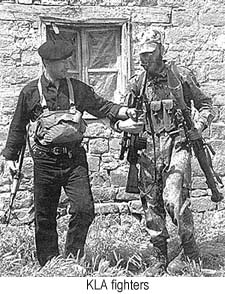
KOSOVARS INSIST ON INDEPENDENCE. Bujar Bukoshi, the prime minister of the Kosovar shadow-state government, told the Croatian weekly "Feral Tribune" of 8 March that the Kosovars demand nothing short of independence from Serbia and Yugoslavia. He stressed that following the recent violence, "no kind of autonomy is acceptable" and that the Albanians can "no longer tolerate being under Serbia or with Serbia." A UĒK spokesman told the same Croatian newspaper that Belgrade has left the Kosovars only one option: a war for national liberation. The conflict, he predicted, will eventually draw in all Albanians currently under the rule of Serbs, Montenegrins, and Macedonians. The international community, however, has repeatedly told the Kosovars that their future lies within Yugoslavia, albeit with wide-reaching autonomy. PM SERBIA THREATENS MEDIA. A spokesman for the state prosecutor's office said in Belgrade on 6 March that the authorities will take unspecified measures against several independent newspapers and radio and television stations because their reporting allegedly "encouraged the actions of terrorist bands [a reference to the UĒK] in Kosovo." The newspapers are "Nasa Borba," "Blic," "Dnevni telegraf," "Danas" and " "Demokratija," an RFE/RL correspondent reported from the Serbian capital. PM RFE/RL Newsline Vol 2, No. 46, Part II, 9 March 1998 |
Albanian guerrillas trained by "Muslim army" in Bosnia
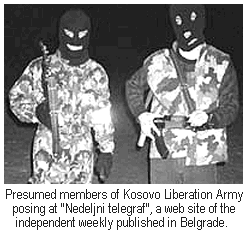 A few days after the Kosova crackdown by Yugoslav special anti-terrorist forces killing tens of Albanians including complete families, women and children in Drenica and Prekaz which brought once again the FR Yugoslavia under the international presure, Dnevni Telegraf, a Belgrade daily newspaper in Serbian language (5 Mar 98) quoted an anonymous "senior Yugoslav Army officer" claiming the members of ("fascists" and "terrorists") Kosova Liberation Army (KLA) were trained by "Muslim army" in Bosnia. |
|
Banja Luka: "The Shiptar (a derogatory term for Kosovari Albanians, Kosovo Albanians) terrorists in Kosovo-Metohija are also being trained by the former members of the special units Crni Labudovi (Black Swans) and Zivinicke Ose (Zivinica Wasps) of the Muslim army in Bosnia-Hercegovina," a senior Yugoslav Army officer claims in a statement for Dnevni Telegraf, wrote B. Maric. "A part of the fascist Kosova Liberation Army [Serbo-Croat abbreviation - OVK; Albanian abbreviation - UĒK] was also trained in Bosnia-Hercegovina in its army's units. A certain number of the Muslims from Raska [Sandzak - region straddling Serbia and Montenegro] underwent the training, too. They were all on the lists of soldiers of the regular Muslim army units in Bosnia-Hercegovina." "There are indications that recent events in Skadar [Shkoder, in northern Albanian, where there was unrest in late February] were actually a dress rehearsal for the OVK terrorists; the terrorists were to demonstrate in practice if they were capable of taking full control over a town that in size corresponds to several towns in Kosovo-Metohija," the source for Dnevni Telegraf says. "The Zivinicke Ose were a part of the 2nd Tuzla Corps while the Crni Labudovi were the striking fist of the 1st Sarajevo Corps of the Muslim Army. These saboteur-terrorist formations were pronouncedly aggressive in nature," Dnevni Telegraf's source says. |
|
Use of Mercenaries  "Regarding the armed conflicts which occurred on the territory
of the former Yugoslavia, it is recommended that the Commission
should reiterate its support for the investigation of the presence
of mercenaries, foreign combatants, members of international brigades,
volunteers, mujahidin and Islamic combatants in those conflicts
and call for the immediate departure from those territories of
the mercenaries still in the countries concerned. It is also recommended
that the Commission welcome the Dayton Agreements and support the judicial investigations carried out by the International Criminal Tribunal for the former Yugoslavia in the Hague concerning persons
charged with war crimes, and by a number of national jurisdictions
concerning mercenaries charged with various offences and violations
of international humanitarian law and human rights."
"Regarding the armed conflicts which occurred on the territory
of the former Yugoslavia, it is recommended that the Commission
should reiterate its support for the investigation of the presence
of mercenaries, foreign combatants, members of international brigades,
volunteers, mujahidin and Islamic combatants in those conflicts
and call for the immediate departure from those territories of
the mercenaries still in the countries concerned. It is also recommended
that the Commission welcome the Dayton Agreements and support the judicial investigations carried out by the International Criminal Tribunal for the former Yugoslavia in the Hague concerning persons
charged with war crimes, and by a number of national jurisdictions
concerning mercenaries charged with various offences and violations
of international humanitarian law and human rights."
UN Commission on Human Rights Thematic Reports - Use of Mercenaries - Special Rapporteur's Report E/CN.4/1996/27, 17 January 1996 |
|
Albania "in the process of identifying this organisation" The Albanian government will continue to engage in defusing tension in Kosova. It favours a fair and lasting solution to the Kosova issue, also acceptable to the Albanian population there, Prime Minister's spokesman Ben Blushi told a news conference on Saturday. Referring to the Kosova Liberation Organisation, the spokesman said that "the government is in the process of identifying this organisation. We do not support any kind of terrorism, but condemn Serbian state terror against innocent women and children in Kosova," the spokesman concluded. [ALBANEWS] "Zeri i popullit" 8 March 1998 |
|
ARM elements at the Macedonian border
Albanian media report the increased presence of ARM elements at the Macedonian border towards Kosovo, as well as that several camps and barricades had been set up in this section. `Rilindija' reveals that measures had been taken to move inhabitants of the border region to safer areas in the interior of Macedonia. MILS NEWS Skopje, 09 March, 1998 |
|
Associations and NGO's about Kosovo
THE KOSOVO ISSUE IS AN INTERNATIONAL ISSUE THAT RISKS TO ESCALATE TO A NEW WAR IN THE BALKANS. 1. It is not possible to justify the Serbian police and army attacks that have been taking place since the 28th of February in the Drenica area as anti-terrorism operations. The shelling of private houses, the killing of civilians, including a pregnant woman and people from 16 to 70 years old, the mutilation of corpses, are patent violations of Human Rights. 2. The foreseeable effect of this operation is not the elimination of the so-called Kosova Liberation Army (UĒK), but the strengthening of the popular sympathy among the Kosovo Albanians for an armed and violent struggle. The 10 years long non-violent policy has up to now prevented the spreading of war to the Kosovo region. The lack of improvements of the situation and the recent attacks may seriously damage this non-violent option. 3. Still, there are forces that can continue the non-violent policy, but their task is impossible without a radical change in the practical attitude, support and effective help from the international community. Society for Threatened Peoples (South Tyrol, Italy) Campaign for a non-violent solution in Kosovo (Italy) Bertelsmann Foundation (Germany) Helsinki Citizens' Assembly Movement for an Non-violent Alternative - MAN (France) Pax Christi International Peaceworkers (USA) Bolzano, March 8, 1998 |
|
Serb serial murderers resume work
by Eric Margolis 8 March 1998 Last year, Albanian resistance fighters, the Kosova Liberation Army (KLA), began attacking Serb paramilitary police. Based in Switzerland, the KLA is funded by the large Albanian diaspora. The KLA aims to drive Serb occupation forces from Kosova, and create an independent state. But Kosova is too small and poor to survive alone. KLA militants want to eventually unite with their 3.5 million brothers in neighboring Albania, and Macedonia's 1 million Albanians. While accepting de facto creation of ruined Greater Serbia, and prosperous Greater Croatia, the US and Europe strongly oppose reunification of the Albanian people which, they fear, will provoke another Balkan firestorm. Last week, US special Balkan envoy Robert Gelbard even stupidly described the Kosova Liberation Army as `terrorists.' Serbs immediately began massacring Albanians. `Terrorists,' it seems, are any group that disturbs the Pax Americana. Though Serbs are under 10% of Kosova's population, they claim it `holy soil,' the site of their decisive defeat in 1389 by the Ottoman Turks. Serb nationalist-nazi mythology depicts Serbia as eternal crusading champion and bulwark against advancing Islam. In historical fact, after the fabled battle, subsequent Despots of Serbia, Stephen Lazarevich and George Brankovitch, were close allies of the Turks. Serbs actually joined the Turks in fighting Hungarians and Albanians, who were trying to stem the Ottoman advance. Despot George even became Sultan Murad's II's father- in-law! So much for Serbia's glorious anti-Turk crusade. This century, Serbs have attempted numerous times to make Kosova `Albanian-frei,' slaughtering 100,000 Albanians alone in post-World War II pogroms. The late Mother Theresa, an Albanian, was driven from Kosova by Serbs. Albanians are a warlike people, often likened to highland Scots. But until recently, Kosovars had no weapons. After the conservative Albanian government of Sali Berisha collapsed last year, plunging Albania into chaos, some weapons from looted arsenals reached Kosova and Albanian Macedonia. The west is deeply worried that shaky Macedonia, the strategic heartland of the Balkans, will splinter as Albanians seek unity with their brethren. This could ignite a five-way war between Bulgaria, Greece, Turkey, Albania and Serbia - the fourth Balkan War this century. The US keeps a `UN' battalion in Macedonia to seal its border with Albania. Though many Kosovar and Macedonian Albanians aspire to unity with Albania, few want to join ruined, chaotic Albania right now. A pathetic mess, Albania has fallen again under control of the Hoxah communists (now relabled `Socialists')- aided by the Italian Communist Party. Former agents of the dread Stalinist secret police, Sigurimi, are returning to Albania. Albania is in ruins, divided, de facto, betweem largely Tosk communists from Tirana on south; and the anti-communist Gheg mountaineers of Sali Berisha in the wild north. An Albanian `intifada' in Kosova may well produce widescale massacres of Kosovars by Serb regular and paramilitary forces, who have already demonstrated their bravery and skill in murdering unarmed Bosnian and Croat civilians. Lasr week, Washington and London delivered dire warnings to Serbia to refrain from more butchery, threatening to re-impose recently lifted sanctions. Still, the US and Britain continue to treat Serbia's despot, Slobodan Milosevic, a Balkan version of Saddam Hussein - but much smarter - with kid gloves, while threatening to pulverize Iraq, even though Serbia, too has chemical, and, possibly, some germ weapons. The war Milosevic unleashed in 1989 killed over 350,000 people, and left 3 million refugees, including many Serbs. The west, however, chooses to do business with the devil in Belgrade, but not the one in Baghdad. The US is bribing Milosevic to keep Bosnia quiet. Tragically, Kosova was not even mentioned in the cynical Dayton agreement that ended the fighting in Bosnia. (Full text) Foreign Correspondent Inside Track On World News By International Syndicated Columnist & Broadcaster Copyright © Eric Margolis, 1998 WWW: Big Eye |